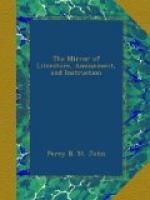* * * * *
YOUTHFUL PHILOSOPHY.
The young Princess Esterhazy was a great favourite of George IV. At a ball given in honour of his Majesty’s birth-day, the young ladies were each expected to kneel, and present him with a nosegay; but the princess declared, that as she was of royal blood, she would prefer death to such degradation. The King received her graciously, notwithstanding her obstinacy; but her governess sent the child to bed immediately after dinner. “Bon pour la digestion,” exclaimed the princess; which so enraged the governess, that she took her out of bed and whipped her soundly. “Bon pour la circulation,” said the princess; and the next day the governess resigned.—Atlas.
* * * * *
PLAIN SPEAKING.
At St. Augustine’s Sessions, in an appeal case, a witness was asked by Sir Edward Knatchbull, to relate what took place between him and his master, which he did as follows:—“I told him he was a liar.” Chairman—“Very improper language.” Witness—“Can’t help that, I am come here to speak the truth, and you have got it.”—Kent and Essex Mer.
* * * * *
THE DEAD HAND.
It is an opinion very prevalent among the “finest pisantry in the world,” that a lighted candle placed in a dead man’s hand will not be seen by any but those by whom it is used; and also that, if a candle in a dead hand be introduced into a house, it will prevent those who may be asleep from awaking! Under the influence of this superstition, a party, a few nights since armed with a dead man’s hand and lighted candle, attacked the house of Mrs. Leonard (the mother of the priest), in the town of Oldcastle, county of Meath; but, unfortunately for the credit of the creed, the inmates were alarmed, and the robbers fled, leaving the hand behind them.




